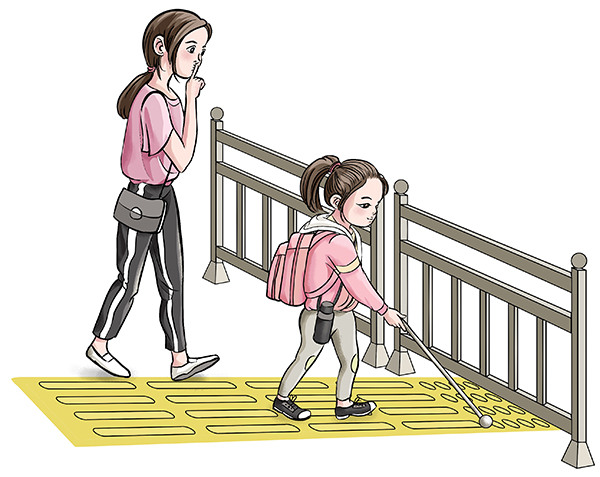
Ma Xuejing/China Daily
Gao Ya, an 11-year-old blind girl in Harbin city, Northeast China's Heilongjiang province, is proud of walking 368 meters alone every day to and from school. She does not know that her mother accompanies her all the way. China Daily writer Zhang Zhouxiang comments:
The woman loves her daughter so much that she accompanies the girl to and from school to ensure she is safe, yet she wants the girl to be independent, so she follows her without letting her know she is there.
However, in this moving story there is one detail to which we should pay attention. The distance from the girl's home to her school is only 368 meters, but it takes the blind girl 15 minutes to complete the journey. Why? From a video clip posted online, it can be seen that she has to navigate past staircases, crowded corridors, sewer manholes and randomly parked cars.
There are all these obstacles in her way and no well-designed path for the blind and visually impaired. It is good that the girl's mother is willing to accompany her to and from school, but it would be much better if her daughter was able to complete the journey on her own.
The lack of barrier-free facilities is a major problem in many Chinese cities. It was in the early 2000s that they started to construct barrier-free facilities for disabled people. However, almost two decades later, only a few metropolises such as Beijing and Shanghai have met the required standards. Harbin is a provincial capital, yet the case of Gao shows its barrier-free facilities are far from enough.
And even well-constructed barrier-free public facilities need maintenance. In an essay in 2013, Lyu Shiming, vice-chairman of China Disabled Persons' Federation, pointed out that the problem of blocked sidewalks is quite a common one and called for a solution to the problem.
A solution is easy to propose in theory-build more barrier-free facilities and employ more staff to maintain them-but hard to deliver in practice. As both of these measures require funds.
And there is the nub of the issue, more public money needs to be spent to make life easier for disabled people, so that they can be equal members of society.